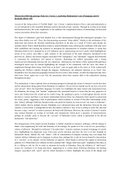Discuss the following passage from Act 2 Scene 2, exploring Shakespeare’s use of language and its
dramatic effects [15]
As part of the rising action of ‘Twelfth Night’, Act 2 Scene 1 explores themes of love, class and melancholy as
we are introduced to the mournful Sebastian and his devoted servant, Antonio. Through its overlap of servitude
and homoeroticism, the scene emphasises to the audience the complicated nature of relationships in Illyria and
creates uncertainty about their outcomes.
The depth of Sebastian’s grief and familial love is first demonstrated through the astrological metaphor “my
stars shine darkly over me”. Here, the disconcerting oxymoron “shine darkly” alludes to the misfortune of the
shipwreck and mirrors the disorder manifesting elsewhere in the play as a result of Viola’s male facade; his
certainty about Viola’s death therefore creates a comical dramatic irony, allowing the confusion of the play to be
fully established and causing the audience to anticipate the repercussions of mistaken identity. It seems that
Sebastian believes he is haunted by an evil influence and is experiencing survivor’s guilt, which highlights the
extent of his sorrow and offers a stark contrast to the narcissism of the male characters introduced in the
previous act. Indeed, the disease imagery associated with “malignancy” and “distemper” suggests that Sebastian
is concerned his misfortune will spread to Antonio, illustrating his selfless personality and a strong
master-servant relationship between the two characters. Alternatively, the theme of fate explored through these
astrological terms may be instead highlighting the strength of his connection with his twin; this union is
emphasised through them being “both born in an hour”, and yet again adds to the irony as Viola is physically
adopting her brother’s identity through her disguise. Furthermore, the temporal reference to an “hour” may
foreshadow how the physical geography between the two twins is also similar, yet after the shipwreck they have
both been “born” again into a new life; the uncertainty about their reunion adds to the melancholy running
throughout the play.
This melancholy is later explored from an alternate perspective through the extent of Antonio’s servile devotion
and his dread about being parted from Sebastian: he implores “If you will not murder me for my love, let me be
your servant”. Here, the hyperbolic language of courtly love highlights the deep respect and connection he has
for Sebastian; the strong verb “murder” emphasises this emotional bond as it seems that his only purpose is to
serve and without him life would not be worth living. By speaking in prose, it would appear that his servile
devotion is sincere and there is an honest relationship between these two characters; their speech is natural and
not overly poetic, suggesting a lack of performance which contrasts to several of the other relationships in the
play. Indeed, although Sebastian had previously concealed his identity, he soon reveals “my name is Sebastian”,
which implies that he perhaps favours friendship over self-preservation and the distinction between his and
Antonio’s social status is unimportant to him; this mirrors Antonio’s view, as he is willing to lower his class and
become a mere “servant” in order to preserve his bond with Sebastian. However, the extent of Antonio’s loyalty
may instead illustrate an overlap of servitude and romanticism which gives a dynamic of homoeroticism;
perhaps he actually seeks to become the “servant” of Sebastian’s heart, which is epitomised in his fervent
declaration “I do adore thee”.
The transgression of the master-servant boundary is further explored in Antonio’s soliloquy, with the change to
blank verse emphasising the truth and formality of his feelings; he speaks as if he is one in love, presenting a
climax of affection. Through his confession “I do adore thee”, Antonio continues to speak in language of courtly
love, highlighting his digression away from pure servile devotion and how his love is in fact founded on
homoerotic desire. Indeed, the verb “adore”, with its connotations of religious worship, may even imply that
Antonio idolises Sebastian and is desperate to please him; perhaps this is why he lowers himself to the position
of a “servant”, as he already viewed Sebastian as superior, which begins to present the captain as possessing
qualities of a Petrarchan lover. Indeed, his later comment that “danger shall seem sport” emphasises this idea, as
he is willing to risk his life in order to maintain his loyalty to Sebastian. Here, the sibilance of “shall seem”
causes his comment to be sharp and direct, suggesting he is certain about following Sebastian; the hunting
imagery associated with “sport” and his initial hesitation to follow highlights the extent of the danger and





